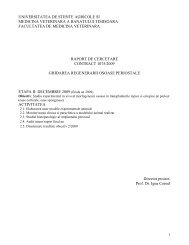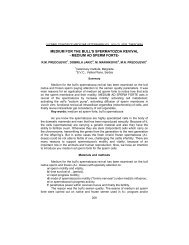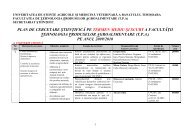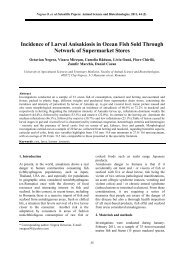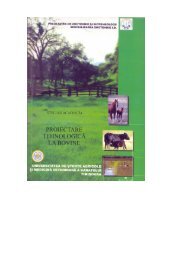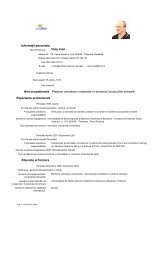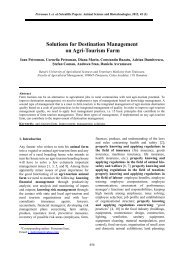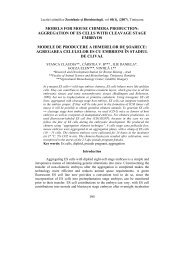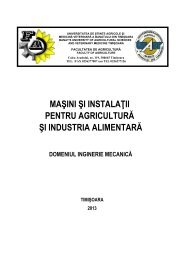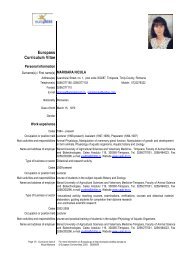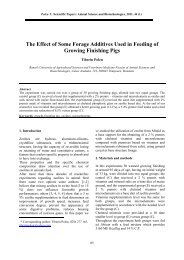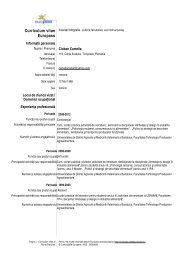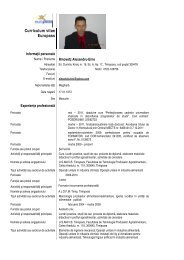journal of linguistic studies
journal of linguistic studies
journal of linguistic studies
You also want an ePaper? Increase the reach of your titles
YUMPU automatically turns print PDFs into web optimized ePapers that Google loves.
- parking (DOOM 2005) – etymological spelling;<br />
- taim-aut (DEX 1998) – phonetic spelling;<br />
- time-out (DOOM 2005) – etymological spelling.<br />
3. ANALYSIS<br />
Lyutakova Rumyana approaches the topic under discussion in an article (The<br />
orthographic adaptation <strong>of</strong> English borrowings in Romanian and Bulgarian) that<br />
appeared in the Romanoslavica <strong>journal</strong>, in 2004. She explains that the English<br />
borrowings that enter the Romanian language are first <strong>of</strong> all assimilated from a phonetic<br />
point <strong>of</strong> view and only afterwards from an orthographic one. She also talks about the<br />
different degrees <strong>of</strong> orthographic adaptation. Her classification bears some resemblance<br />
to that <strong>of</strong> Hristea (1995). She mentions three stages <strong>of</strong> orthographic adaptation:<br />
initial/preliminary adaptation, the stage <strong>of</strong> borrowings that are under way <strong>of</strong> adaptation<br />
and the assimilation (borrowings that are completely assimilated into Romanian).<br />
3.1. THE INITIAL ADAPTATION<br />
The English borrowings that fall into this category have an incomplete degree <strong>of</strong><br />
adaptation to the orthographic system <strong>of</strong> Romanian and most <strong>of</strong> them preserve their<br />
original spelling. Lyutakova (2004) remarks that this is actually an open-ended area<br />
where “isolated uses” (2004) may occur but usually such usages do not go beyond this<br />
stage <strong>of</strong> adaptation.<br />
Most <strong>of</strong> the English borrowings belong to this stage and they have an etymological<br />
spelling. Apart from the recent borrowings: hardware, marketing, workshop, feedback,<br />
brainstorming, hold-up, pacemaker, killer, display, challenge-day, duty-free, airbag, etc.<br />
(some <strong>of</strong> them are not recorded in dictionaries <strong>of</strong> present-day Romanian: DEX, MDN,<br />
DOOM), there are also some borrowings whose spelling has not been changed yet<br />
although they are older borrowings: team, bridge, whisky, western, twist, rummy, musical,<br />
etc. Lyutakova (2004) states further that this initial stage can be easily covered if the form<br />
<strong>of</strong> the etymon ranges naturally among those in the Romanian orthographic system. She<br />
provides some examples: hit, top, poster, spot, card, and clip.<br />
3.2. ENGLISH BORROWINGS THAT ARE UNDER WAY OF ADAPTATION<br />
This represents the intermediary stage that” shows the evolution <strong>of</strong> the borrowing in<br />
its way towards assimilation” (Lyutakova 2004). The borrowed word has a transitory<br />
form displaying the features <strong>of</strong> both the donor and the receiving language (a combination<br />
<strong>of</strong> etymological and phonetic spelling). The borrowings that are at this stage have hybrid<br />
spellings and, for some <strong>of</strong> them, more than one spelling is recorded in the dictionaries.<br />
The spelling variants denote “the evolution and the direction <strong>of</strong> changes that took<br />
place in the process <strong>of</strong> adaptation” (Lyutakova 2004). As long as there are still variants <strong>of</strong><br />
spelling the process <strong>of</strong> assimilation is not completely over.<br />
Mioara Avram (1987) distinguishes between the variants recorded and accepted by<br />
DOOM and those used in every day speech which are not recorded in that dictionary or in<br />
others that tackle normative issues. There are many examples <strong>of</strong> spelling variants<br />
(etymological/phonetic spelling):<br />
31



